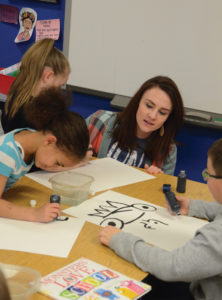
By Steve Brawner, © 2019 by Steve Brawner Communications, Inc.
If I were to tell you that one school district was singled out this year by the Arkansas School Recognition Program, you probably wouldn’t guess it would be Bismarck.
The rural district outside of Hot Springs doesn’t have an international corporate behemoth in its backyard. Sixty-three percent of its students qualified for free and reduced lunch prices last school year, compared to a state average of 60 percent.
But when almost $7 million was awarded to 175 schools based on test scores and improvement, all three of Bismarck’s schools specifically were honored by Gov. Asa Hutchinson at the State Capitol Oct. 29. School personnel and students attended the event.
Through the program, the 51 schools in the top 5 percent in performance and growth received $99.18 per student. The top 6-10 percent received $49.58 per student.
Bismarck Elementary received almost $36,500 for ranking in the top 5 percent in student performance, and that same amount for ranking in the top 5 percent in student growth. Ranking as one of the state’s best schools in both performance and improvement is an impressive achievement, especially considering the school already was in the top 6-10 percent for performance the previous year. Bismarck Middle School and Bismarck High School each received more than $15,000 for ranking in the top 6-10 percent.
It was the second straight year all three schools received awards through the program, which began in 2013. No wonder schooldigger.com ranks Bismarck the state’s fifth best district.
So what’s Bismarck doing right?
During a visit with district administrators and teachers Feb. 25, one obvious reason for its success is its team approach.
Several years ago, Bismarck fully embraced the professional learning communities concept. PLCs emphasize collaboration and communication. Teachers have both grade level and vertical (different grades) meetings, and educators often communicate verbally and through email.
The approach creates connections so that what students learn in one grade will more likely prepare them for the next. Moreover, high school science teacher Leah Beckwith, now in her 24th year of teaching, said teachers can bounce ideas off each other about how to reach particular students.
“I meet with this group of teachers every week, and I say, ‘Gosh, I’ve had the worst time with him this week. Do you know anything going on in his life?’” she said. “Well, as soon as I know what’s going on in his life, I can problem solve. I can provide extra help, or I can provide a meal, whatever.”
Staff members say a spirit of collaboration infects the entire district. School librarians are actively involved in professional learning community teams. Last year, the middle school decided everyone would read “Wonder,” an inspiring children’s novel about a fifth grade student with a facial deformity. Everyone in the school, including secretaries and janitors, was given an assignment to read it. Principal Ellen Coleman said janitors see the children every day, and she would hear one participate in a conversation about the book. Winning schools form committees to determine how to use the award funds. Bismarck gave bonuses to all the staff members, including teachers, bus drivers and cafeteria workers.
The district also encourages students with incentives. For example, students who scored at “ready” or “exceeding” on the state’s ACT Aspire test walked across a stage and were given medals to wear around their necks. Bismarck High Principal Tony Chambers said, “Those students that got more than one jingled the rest of the day.” Some of the special education students earned medals. According to Coleman, “That was probably the proudest moment.”
Ultimately, Bismarck’s success is based on a culture of teamwork and accountability. Professional learning communities helped make that culture possible.
As Beckwith explained, “I used to just feel like it’s my classroom. I’ll shut the door and teach what I want to teach and I’ll do my thing in here. But now I really feel accountability to my 11th grade team or my science team or whatever.
“I just, I don’t want to be the weak link. I look at it as, I want to be pulling my load. There’s an expectation, and heaven forbid I’m the one not meeting the expectation.”